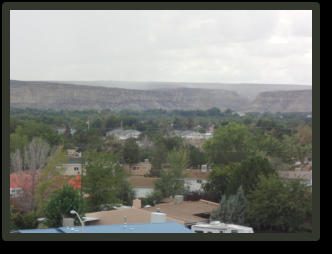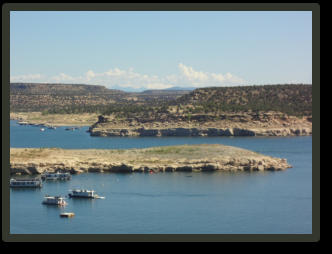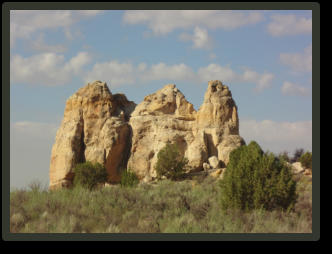



VISION
Speak Out!
G












SPEAK OUT!
Why It is Important to Keep Nature Around a
Developing City
Natural areas filled with trees,
bushes, flowers, insects and
animals are like children in a
family: when they grow up
together over eons of time, they
learn to work together with
different roles. In the process,
they become mutually adapted to each
other and have special survival functions within
specific geographic areas. Their unique qualities are
abruptly severed when people remove them from a
piece of land for development, usually through bulldozing
or logging.
Sophisticated Tapestry
An area with natural trees and vegetation is similar to a sophisticated
piece of
art or music; it took a long time to create that intricate network of organisms in sync
with one another. When we scrape off a natural area, we mirror burning the work of a
master painter or musician who has painstakingly put something together after many
hours of dreams, visions, sleepless nights, merciless editing and constant revisions; in
minutes an ancient masterpiece is destroyed through something as mundane and course
as the blunt and noisy blades of bulldozing.
Humans Can Destroy a Millenium In Minutes
What may take us hours to get rid of with the rough sweep of a machine took nature
hundreds of thousands or millions of years to create through the complex process of
evolution. Our natural world is increasingly shrinking; all kinds of forests from smaller
southwestern pinion and juniper trees to tall firs are receding fast. Any drive through
forests in this country makes it clear many of them are in bad shape and vulnerable to
pests, disease, drought and fire. It is important to develop a sensitivity to nature so that
more and more people feel the need to keep the trees on lands prone to development
because it is something they know and feel inside themselves. We cannot tell people
what to do with their own property, but we can encourage a cultural shift away from
destruction through education. We can also help people develop a heightened sensitivity
to the artistic qualities of the natural world by revealing its very genuine beauty to those
who will listen. In addition, we can honestly make it clear that keeping nature around is
good for business, people's health and well-being, and the broad needs of the whole
planet.
Speak Out For A More Active, Assertive and Organized Approach to Earth-
Wise Cities
Speak up and become organized
against widespread destruction
of the natural world as cities
develop. Frequently the people
with money are not always the
ones who are the most sensitive
to the environment. Keep
people who are not awake and
sensitive to the natural world
from destroying it as they
develop cities and other areas
for themselves. Do this by being
organized and assertive in
countering their tendencies with
more productive approaches.
Although it is a sad commentary
on the history of the United
States in terms of depicting who
has tended to dominate cities as they grew, what has actually happened in this country
for a large part of its history is that forest after forest and other natural areas were
completely destroyed in the wake of economic and city development.
Old Habits Are Hard to Break
There is a long-standing cultural habit in this country to destroy, tear down and wipe out
large patches of the natural world under the illusion that real progress and a good
economy looks a certain way in a modern society - this has often included creating bigger
and more luxurious commercial properties or sprawling tracts of residential housing.
People put a premium on size and grandeur rather than on a quietly dignified or humble
respect for the natural world. This is still going on today despite the many warning signs
that the natural world and planet are in serious trouble in various ways and places.
Historically, Americans have thought it was not acceptable or popular to speak up for the
environment, believing the people with demonstrable shows of money somehow were
the real achievers in society and miraculously knew better than they did. They would
make comments like "those tree-hugging fanatics are making a big deal out of a few
stupid spotted owls or a bunch of trees when humans need jobs and houses." That is
often a fallacy in popular thinking; people with money tearing down nature to develop
businesses, churches and large tracts of residential properties are not always that smart
or insightful - often they just have the money. Developers make weak excuses
proclaiming the urgent needs of humans to get away with their destructive behaviors
when carefully thought out options are available given a little more time and finesse.
When Things Get Rough, People May Tend to Shoot from the Hip
Aggression and dominance in clearing large tracts of natural land in business projects
may be a sign of a lower - not a higher - form of intelligence. It is a sort of brute
mentality dominating other kinds of thought choices and behaviors. It is important to
pay attention to this fact. Shooting from the hip is not the best answer. Going after
easily available resources rather than putting together a more detailed and sophisticated
plan to solve humanity's problems has been a long standing tendency. When things get
tough, we go after precious old growth forest trees, oil and gas, minerals or whatever we
can get our hands on without sitting down and really thinking the problem through to
create solutions for everyone. In other words, we take out the environment in the
process of trying to help ourselves with quick fixes. These destructive cultural habits
need to stop.
In addition, while using non-replenishable resources like coal and oil and gas, we put out
toxic pollutants which are hard on human health. Because we often cannot correlate
human health problems with mixed industrial toxins in the vicinity, things can go
unchecked for decades before changes finally are made. In the meantime, people may be
living in a soup of dangerous air, water and soils, often tuning it out. They may continue
on their ill-driven paths, not stopping to insist on higher quality solutions.
Seeking Higher Ground and a Higher Intelligence in Land Usage
We can stand up to social pressure and create another approach to the natural world in
a growing city - one that respects nature and makes it socially acceptable and desirable to
stand up for it while keeping as much of it as possible. Sadly, the doers in society have
not always been true visionaries for planetary well-being; they often focus on the short-
term gains without looking at the long-term consequences. This type of behavior is still
going on today, but we need to learn from our past mistakes as a country by not letting
these kinds of behaviors dominate our landscapes. Let us not stand by permitting
destruction of nature continue to happen during urban sprawl. Let us believe in our own
intelligence, wisdom and personal power in speaking up for the environment.
Earth-Wise People Need to Organize Across the Board
People who are more environmentally sensitive and awake need to overcome the
tendency to be quiet. Environmentally oriented people may tend to be loners enjoying
the peace of nature and may prefer to stay out of the problems of cities. They may tend
to want to do their own thing and not be organized joiners, which makes it difficult to
draw like-minded people together in an organized or systematic way to fight the
problems of urban sprawl and
wilderness degradation. Again,
do not stand by and watch
neighbors and fellow business
people take out the natural
world as they develop residential
and commercial property. Pay
attention to the destruction as it
occurs and push back. Do not
just look away or follow the
crowd. The more we stand up to
this kind of destruction, the less
culturally acceptable it will be.
This will be better for all of us in
the long run. Large tracts of city
with endless pavement,
sidewalks, brick, stone, glass,
cement, gravel and so on are
comparatively lifeless and dull compared to the natural world. Try to keep as much of
nature intact within and around the cities as they grow. Do not wipe out all of nature
while developing a city. Keeping nature around is better for business, humans and the
planet. Cities with nature flowing throughout their areas tend to have more life force or
spark, and they also attract intelligent, creative, sensitive and aware people who are
earth-wise and good for the city. The more a city loses contact with the natural world, the
duller, less dignified and more mundane it becomes. This reflects in its inhabitants. The
natural world helps keep a city filled with natural beauty, vitality and hope.
Drought and Water Shortage
Notice when high population areas or other population centers start taking water from
other areas when their own supplies dwindle. At some point, these centers must take
responsibility for their own approaches and demands - they cannot keep taking from
other locations. Phoenix, Arizona
and Los Angeles, California are
two major examples of large
cities that utilize diverted water
systems from other areas.
Phoenix is a gluttonous drain
hole in one of the hottest areas
in the country; it takes far more
than it gives and its entire
cosmopolitan approach is
obnoxious and irresponsible. It
has far too many people living
there, for one thing, often in
crowded urban conditions. From
airplanes coming into the city
people can see urban sprawl
depicting buildings and streets
giving off a boxed in and lined up
look and feeling. The lots show
no elbow room and the only
thing breaking up the monotony
are the artificially planted palm trees.
But when you add this population issue to reflections on the climate and the actual
available resources, you start realizing the area has a serious problem. It is living on the
edge of catastrophe in its own way not so unlike areas on the edge of ocean shores with
typhoon or tsunami potential. People there are living luxuriously and wastefully given
the natural (harsh) realities of the area - no one can survive there without air
conditioning which means major demands on various systems (electrical, water, etc.)
through both dwellings and cars. When you try to make a fry pan an artificial
refrigerator most of the days of the year, it sucks resources and strains both the area
itself as well as the contributing regions around it. One of the smartest ways to live in
the desert is in very thick adobe structures partially built down into the earth to keep
things cool in the heat and warm in the colder months.
updated 11/16/2017







- INDEX - environment
- INDEX resources
- Animal Issues
- Env. concerns SW
- Fukushima
- Fukushima website links-summary
- Recycling
- Water
- Renewable energy
- water issues
- sustainable practices
- Connecting for Conservation
- Libraries & Museums
- Media In Area
- Museums & Archaeology
- Food Competence & Gardening
- Oregon Coast Deforestation
- Schools Nature, Biology, Etc.
- Resources General Environmental
- Solar pros & cons
- Land Use









